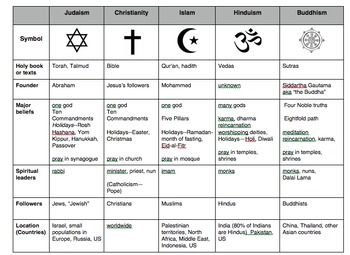· Apologetics & Evangelism · 9 min read
Exploring Islam through Christian Eyes: A Comparative Study of World Religions
Discover how Christians can deepen their understanding of Islam through a comparative study of world religions. Explore Biblical perspectives on Hinduism, Buddhism, and New Age spirituality, fostering interfaith dialogue and cooperation.

Exploring Islam through Christian Eyes: A Comparative Study of World Religions
Introduction
In this article, we will explore the topic of “Exploring Islam through Christian Eyes: A Comparative Study of World Religions” from a Christian perspective. As Christians, it is essential to engage in comparative religion studies to deepen our understanding of other faiths and foster interfaith dialogue and cooperation. By exploring Islam, as well as other world religions, we can gain insights into our own beliefs and find common ground with people of different religious backgrounds.
Why is it important for Christians to engage in comparative religion studies?
Engaging in comparative religion studies is vital for Christians for several reasons. Firstly, it allows us to broaden our knowledge and understanding of different religious traditions, including Islam. By studying other faiths, we can gain a deeper appreciation for the diversity of human experiences and the various ways people seek to connect with the divine.
Secondly, comparative religion studies enable Christians to engage in meaningful interfaith dialogue. By learning about Islam from a Christian perspective, we can build bridges with our Muslim neighbors and work towards mutual understanding and respect. Interfaith dialogue provides an opportunity to address misconceptions, promote peace, and find common ground on shared values.
Lastly, comparative religion studies can strengthen our own faith. By examining other belief systems, Christians can gain a deeper understanding of their own theological foundations and develop a more robust defense of their beliefs. It allows us to critically evaluate our own worldview while appreciating the beauty and wisdom found in other religious traditions.
“In light of the widespread public perception of incompatibility between Islam and Christianity, this book provides a much-needed straightforward comparison of these two great faith traditions from a broad theological perspective.” - John Renard
How does Islam compare to Christianity in terms of core beliefs?
While there are distinct differences between Islam and Christianity, they also share some common core beliefs. Both religions believe in the existence of one true God who is the creator and sustainer of the universe. Muslims refer to God as Allah, while Christians use the term God or Yahweh.
Both Islam and Christianity emphasize the importance of leading a morally upright life. They share common ethical principles such as honesty, compassion, justice, and love for others. Both faiths also believe in the concept of accountability and judgment after death.
However, there are significant theological differences between Islam and Christianity. One of the central differences is the understanding of Jesus Christ. Christians believe that Jesus is the Son of God, who became incarnate to save humanity from sin. In contrast, Muslims consider Jesus as a prophet but reject the belief in his divinity.
“Comparative Religion East Asian Religions Christian Theology Islam Very early in their respective community histories, Christians and Muslims began preserving their core beliefs in narratives that enshrined signature characteristics of God’s dealings with them as a unique community.” - John Renard
How does a Christian perspective inform attitudes towards Muslims and Islam?
A Christian perspective informed by the Bible warrants polar-opposite attitudes toward Muslims as people and Islam as a religion. Christians are called to love their neighbors, including Muslims, as themselves. The Bible teaches that all people are made in the image of God and deserve respect and dignity regardless of their religious affiliation.
However, it is essential to differentiate between loving individuals and evaluating beliefs and doctrines. While Christians are called to love Muslims as people, they may have theological disagreements with certain aspects of Islamic teachings. It is crucial to approach these discussions with respect, humility, and a genuine desire for understanding.
It is important to note that individual Christians may have different perspectives on engaging with Islam. Some may prioritize evangelism and sharing their faith with Muslims, while others may focus on building relationships and promoting peace through interfaith dialogue. Regardless of individual approaches, love and respect should be central in all interactions.
“Muslims as people are loved by God and should be loved by Christians. This holds true not only for Muslims but for all the people of the kosmos-people world. Islam as a religion minimizes Christ and therefore cannot …” - Excerpt from “Worlds Apart: Biblical Perspectives on ‘Muslims’ and ‘Islam‘“
How does a Christian perspective approach the study of other world religions?
When Christians engage in the study of other world religions, it is crucial to approach the subject with a spirit of humility, respect, and open-mindedness. The study of other faith traditions should not be seen as a threat to one’s own beliefs but rather as an opportunity for growth and understanding.
A Christian perspective on the study of other religions should be grounded in a commitment to truth-seeking and an appreciation for the diversity of human experiences. It is essential to rely on credible sources and expert knowledge within the field of comparative religion studies.
Christians should strive to understand the core beliefs, practices, and values of other religions without compromising their own faith. By studying other faiths, Christians can gain a deeper understanding of their own religious identity, strengthen their convictions, and find common ground with people of different religious backgrounds.
“Engaging in comparative theology enables us to approach religious others with greater empathy and understanding, fostering mutual respect and cooperation.” - Grounding Theology of Religions in Comparative Theology
How does a Christian perspective view Hinduism and Buddhism?
From a Christian perspective, Hinduism and Buddhism are significant world religions that offer unique insights into the human search for meaning and transcendence. While there are theological differences between these religions and Christianity, there are also areas of overlap and shared moral values.
Hinduism is characterized by its diverse pantheon of gods and goddesses, belief in karma and reincarnation, and the pursuit of moksha or liberation from the cycle of rebirth. Christians may admire the rich cultural traditions, devotion, and ethical teachings found within Hinduism. However, they would reject the belief in multiple gods and the concept of reincarnation.
Buddhism, founded by Siddhartha Gautama (the Buddha), emphasizes the path to enlightenment and the cessation of suffering. Christians may appreciate Buddhist teachings on compassion, mindfulness, and the importance of ethical living. However, they would differ in their understanding of salvation and the need for a personal relationship with God through Jesus Christ.
It is important for Christians to approach the study of Hinduism and Buddhism with a respectful and discerning attitude. While recognizing the shared values, it is crucial to understand the differences in theological beliefs and evaluate them in light of Christian teachings.
“By studying other faiths, Christians can gain a deeper understanding of their own religious identity, strengthen their convictions, and find common ground with people of different religious backgrounds.” - Exploring Islam through Christian Eyes: A Comparative Study of World Religions
How does a Christian perspective engage with New Age spirituality?
New Age spirituality encompasses a wide range of beliefs and practices that draw from various religious traditions, esoteric philosophies, and alternative healing modalities. From a Christian perspective, it is important to approach New Age spirituality with discernment and caution.
While some aspects of New Age spirituality may overlap with certain Christian teachings, there are key differences that raise theological concerns. New Age spirituality often promotes a self-centered approach to spirituality, emphasizing personal enlightenment and spiritual autonomy rather than submission to God.
Christians should be aware of syncretism, which is the blending of different religious beliefs and practices that can dilute or compromise the core tenets of Christianity. It is essential to evaluate New Age teachings in light of biblical truth and seek guidance from trusted Christian leaders or theologians.
However, it is also important to recognize that individuals exploring New Age spirituality may be genuinely seeking spiritual fulfillment or healing. Christians should approach these individuals with love, understanding, and a desire to engage in meaningful dialogue. Building relationships based on respect and trust can provide an opportunity to share the unique message of the Gospel.
“By learning about Islam from a Christian perspective, we can build bridges with our Muslim neighbors and work towards mutual understanding and respect.” - Exploring Islam through Christian Eyes: A Comparative Study of World Religions
How does a Christian perspective promote interfaith dialogue and cooperation?
Interfaith dialogue and cooperation are essential for Christians to foster understanding, build relationships, and promote peace among people of different religious backgrounds. A Christian perspective on interfaith dialogue should be grounded in love, respect, and a genuine desire for mutual understanding.
Christians can engage in interfaith dialogue by actively listening to the beliefs, experiences, and concerns of individuals from other religious traditions. It is important to approach these conversations with an open mind, seeking common ground and shared values.
Interfaith cooperation involves working together on issues of shared concern, such as poverty alleviation, social justice, or environmental stewardship. By collaborating with individuals from different faiths, Christians can demonstrate the transformative power of their faith and promote positive change in society.
However, it is important to maintain theological integrity while engaging in interfaith dialogue. Christians should be clear about their own beliefs and not compromise the core tenets of their faith. It is possible to engage in respectful dialogue without sacrificing one’s convictions.
“Understanding Interreligious Relations is a multi-authored volume that explores the theme of the ‘religious other’ from the perspective of five major religions—Hinduism, Judaism, Buddhism, Christianity and Islam—and discusses a range of issues in which interreligious relations are central.” - Islam & Christianity: Relations & Dialogue
Conclusion
In conclusion, exploring Islam through Christian eyes is an important endeavor for Christians. Engaging in comparative religion studies allows Christians to deepen their understanding of other faiths, foster interfaith dialogue, and find common ground with people of different religious backgrounds. By approaching this study with humility, respect, and a commitment to truth-seeking, Christians can gain a deeper appreciation for the diversity of human experiences and strengthen their own faith. It is important to maintain theological integrity while engaging with other world religions and to approach interfaith dialogue with love, respect, and a genuine desire for mutual understanding.



